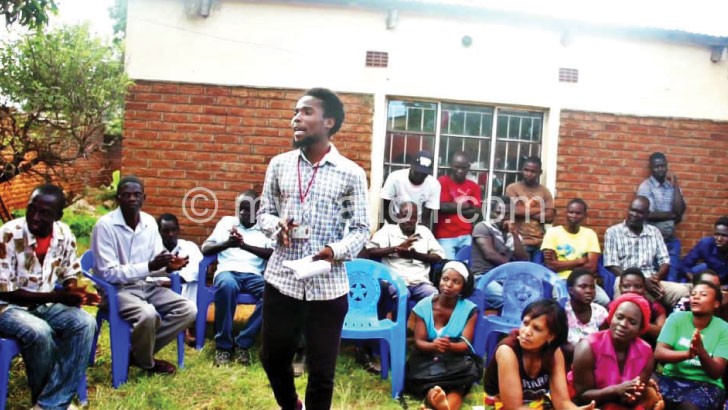Youth gang up against drugs
After noticing many young people in Area 36 high on drugs and liquor, their peers decided they had to do something about it.
The concerned young people in the capital city, Lilongwe, have formed Katantha Youth Action Movement to support their colleagues to return to sanity.
The group is slowly dealing with teen pregnancies, child marriages and abuse of substances that impair one’s thinking.
“This is work in progress,” says chairperson Mwayiwawo Chitsamba. “When we formed the group in 2016, Area 36 was the epicentre of crime, with over 18 youth gangs reported to police. Some young people are still trapped in the web of drug and substance abuse as well as criminality.”
Four years ago, the busting of the criminal gang code-named 11 Bongo lifted the lid on youth involvement in theft, robberies and violent attacks in the densely populated township.

“The youth gangs had records of beating people to death, pick-pocketing, waylaying people in the night, burning people’s houses and other crimes attributed to idleness and substance abuse,” Chitsamba recalls.
The movement to safeguard young people is now working with Youth Network and Counselling (Yoneco) and other partners to report cases to relevant government agencies and stem the wave forcing them to quit school.
The group also raises awareness on the dangers of drug and substance abuse among the youth in their locality.
They mobilise young people to form groups where they deposit their savings and obtain soft loans to start businesses and wean themselves from dependency.
Even parents have formed their own savings and loan circles, where they discuss how to collectively safeguard the youthful majority.
The 2018 census indicates that the youth aged below 35 constitute almost three quarters of the population, but a quarter of those aged above 18 remain jobless even though they are actively searching for employment.
The country’s massive youth unemployment pushed the dominant population into ruinous escapes, including substance abuse and crime.
Chitsamba claims to have abolished all criminal gangs with support from the police, but some groups clandestinely smoke Indian hemp.
“Now, we want community leaders in the area to come up with by-laws banning the sale of drugs and liquor to minors,” he says.
Tingathe, another youth grouping in Area 36, estimates that there are over 10 groups that sell marijuana to the youth in the locality.
The 47-strong organisation blames the challenge on youth unemployment, saying some idle boys and girls join ‘smoking clubs’ to release their shared hardships.
To others, the illegal trade in marijuana happening in some open spaces constitutes a business opportunity.
Tingathe chairperson Ronald Gondwe says: “We use various platforms to keep the youth busy and withdraw them from hazardous substances. “Nowadays, the youth drink liquor and smoke hemp without fearing their parents. We are trying our best to eliminate sales of liquor, cigarettes, hemp and other substances to minors. It will not be easy, but it is worth trying.”
He says it is difficult for the police to crack down on the hemp-smoking clubs alternatively known as marijuana camps.
“The law enforcers work hard to deal with them, but they keep on coming. I suspect they have connection who alert them about planned police swoops. They are never caught,” Gondwe states.
Thomeck Nyaude, deputy national police spokesperson, says sweeping exercises were discontinued by a high workload following post-election unrest in the capital.
He asks the citizenry to work with the police in the fight against drug abuse, which fuels robberies, sexual violence, murders and other horrifying crimes.
Child rights activist Amos Chibwana warns that the silent crisis will persist in the absence of jobs and business opportunities for the youth.
He says: “Although the youth are in majority, they need quality education and relevant skills to benefit from both formal and informal job markets,”
“Government and organisations need to introduce programmes that will identify and develop their skills to make them self-reliant and free from drug and substance abuse.”
In its blueprint, Harnessing Population Dividend, government bills quality education, skills development and decent jobs as pivotal to transforming the youth majority from dependency and self-destruction to become formidable cogs for sustainable development.
Drug Fight Malawi executive director Nelson Baziwelo Zakeyu says lack of a national drug control policy means that government hardly allocates vital resources towards ending the silent scourge numbing energetic young Malawians.
“Currently, it is not unusual to see young people smoking marijuana even in the presence of law enforcers,” he states.





